If you’re thinking about relocating and have Milwaukee, Wisconsin on your radar, you’re not alone. A growing number of people are starting to look beyond the typical metro magnets and consider places with a lower cost of living, strong community values, and rich cultural experiences. Milwaukee ticks a lot of those boxes, but is Milwaukee a good place to live? That’s exactly what we’re about to explore.
Let’s take a close look at what life is really like in Brew City.
What’s Milwaukee Known For?
Milwaukee might not always make the national headlines, but it’s packed with personality. It’s known for its iconic beer legacy, beautiful Lake Michigan shoreline, and passionate sports culture, just ask a Bucks fan. But Milwaukee’s also a city of contrasts. Its historic neighborhoods sit next to revitalized riverfronts, and its Midwest charm is blended with urban grit.
Here’s what makes people curious, and sometimes cautious, about calling Milwaukee home.
Cost of Living in Milwaukee
When compared to cities like Chicago, New York, or Los Angeles, Milwaukee is a budget-friendly haven.
- Average Rent: Around $1,168/month
- Median Home Price: $250,000–$330,000
- Utilities: $160–$200/month
- Public Transit Monthly Pass: $72
According to Numbeo, the cost of living in Milwaukee is 25–30% cheaper than Chicago, and consumer prices are 23% lower. If you’re looking to stretch your dollar without sacrificing quality of life, Milwaukee’s got your back.
Job Market & Economic Outlook
Wondering about job security? Milwaukee has a diverse economy, anchored by industries like:
- Advanced manufacturing (Harley-Davidson is based here)
- Healthcare (Aurora Health and Froedtert Health are major employers)
- Finance & insurance
- Food & beverage (hello, MillerCoors)
As of early 2025:
- Unemployment Rate: 3.8% (close to national average)
- Average Weekly Wage: $1,236 (slightly below national average)
- Top Employers: GE Healthcare, Northwestern Mutual, Rockwell Automation
Milwaukee’s economy is stable, with a push toward tech and sustainability. It may not be Silicon Valley, but it offers solid job opportunities and growth potential, especially for skilled workers.
Housing in Milwaukee
The housing market here is hot but still attainable.
- Median Listing Home Price (2025): $330,000
- Home Price Increase (YoY): 8.7%
- Rental Range: $981–$1,996/month depending on neighborhood
Neighborhoods like BayView and Walker’s Point are popular among young professionals and artists, while Wauwatosa and Shorewood are family favorites. Even first-time buyers can find a decent single-family home under $250K, something unheard of in most big cities today.
And when you’re ready to make the move, don’t forget to reach out to trusted movers in Milwaukee, WI, to take the stress out of relocating. Whether you’re planning a local move within the city or relocating across state lines, we bring a personalized approach to every job.
Our team is experienced in both residential and commercial moves, offering services that include packing, loading, unloading, and even secure storage solutions. What sets us apart is our attention to detail, transparent pricing, and commitment to making every move stress-free.
Safety and Crime
Let’s be honest, Milwaukee struggles with crime. But the city is making progress.
As of Q1 2025:
- Overall Crime Down: 12%
- Non-Fatal Shootings Down: 15%
- Aggravated Assault Down: 23%
- Homicides: Slight increase (from 23 to 25)
Yes, crime is a concern, especially in certain zip codes, but it’s important to know that many neighborhoods are very safe. Areas like Whitefish Bay, Bay View, and East Town have crime rates well below the city average.
Education
Milwaukee’s education scene is a tale of two experiences.
Public Schools
Milwaukee Public Schools (MPS) serve over 66,000 students. However, MPS has faced criticism for leadership instability, underfunding, and inconsistent academic outcomes.
A 2025 audit recommended systemic reforms after identifying outdated systems and administrative inefficiencies.
Private & Charter Schools
Parents often opt for charter or private schools such as:
- University School of Milwaukee
- St. Marcus Lutheran School
- Milwaukee College Prep
These schools generally have stronger outcomes and more parental involvement.
Higher Education
Milwaukee is also a college town:
- Marquette University: Jesuit, top-rated nationally
- Milwaukee School of Engineering (MSOE): Known for engineering, IT, and business
- University of Wisconsin–Milwaukee: A large public university with diverse programs
Transportation and Commuting
Getting around Milwaukee is fairly easy, even without a car.
- The Hop Streetcar: Free downtown transit
- MCTS (Milwaukee County Transit System): Bus system with decent coverage
- Biking: Growing infrastructure and bike-friendly routes
- Commute Time: ~22 minutes (shorter than national average)
It’s also just a 90-minute Amtrak ride to Chicago, making it great for weekend trips or hybrid commuters.
Healthcare Quality and Access
Milwaukee has excellent healthcare options:
- Aurora St. Luke’s Medical Center
- Froedtert Hospital
- Children’s Hospital of Wisconsin
However, healthcare costs are about 9.6% higher than the national average, so quality comes with a price.
Still, the level of care, access to specialists, and top-tier facilities make it a strong contender for those prioritizing health.
Arts, Culture & Entertainment
Milwaukee may not be NYC or LA, but it punches above its weight.
- Milwaukee Art Museum: Iconic architecture and extensive collections
- Pabst Theater: One of the oldest continuously operating theaters in the U.S.
- Summerfest: One of the biggest music festivals in the world
- Harley-Davidson Museum: A must-visit, even for non-bikers
Add to that a thriving craft beer scene, great coffee shops, foodie culture, and quirky festivals like the Milwaukee Film Festival or German Fest, and you’ve got a city that’s never boring.
Outdoor Life & Nature
Thanks to Lake Michigan, Milwaukee is a paradise for anyone who loves water views and outdoor activities.
- Lakefront Trail: Miles of biking and walking paths
- Bradford Beach: Yes, a beach in the Midwest!
- Urban Ecology Center: Nature meets education
- Parks: Over 140 parks and trails across the city
Plus, its low risk for natural disasters and access to freshwater make it increasingly attractive in the face of climate change.
Weather
Milwaukee’s climate is no joke, you get the full spectrum.
- Winter: Cold and snowy (avg. low in January: 13°F)
- Summer: Warm and breezy (avg. high in July: 80°F)
- Spring & Fall: Short but beautiful
Lake Michigan has a moderating effect, but you’ll want a solid winter coat.
People, Community, and Culture
What really makes Milwaukee feel like home? The people.
Milwaukeeans are friendly, community-driven, and proud of their city. It’s a place where local businesses thrive, neighbors greet each other, and civic pride runs deep.
The city’s diversity is also a strength, with vibrant African-American, Latino, Polish, and German communities contributing to its rich culture.
Is Milwaukee a Good Place to Raise a Family?
Pros:
- Affordable housing
- Plenty of parks and museums
- Access to quality private schools
- Strong sense of community
Cons:
- Public school challenges
- Need to choose neighborhoods carefully for safety
Families often settle in suburbs like Wauwatosa, Whitefish Bay, or Oak Creek for a little more space and quieter surroundings.
Is Milwaukee Good for Young Professionals?
Absolutely. If you’re in your 20s or 30s, Milwaukee offers:
- A fun social scene
- Affordable rent and homeownership
- Access to big-city amenities without the big-city price tag
- Quick getaways to Chicago or the Northwoods
Coworking spaces, startup accelerators, and creative communities are growing, especially in places like Third Ward and Riverwest.
Is Milwaukee a Good Place to Retire?
If you’re looking to retire somewhere affordable with a strong sense of place, Milwaukee is worth a serious look. Just keep an eye on healthcare costs and make sure you’re okay with winter weather.
Retirees love areas like Bay View, Wauwatosa, and Greendale for their walkability, community feel, and access to services.
Milwaukee is a city of depth, rich in history, full of real people, and slowly but surely growing into its own. It’s not perfect, but it’s real. And for many, that’s more than enough.







